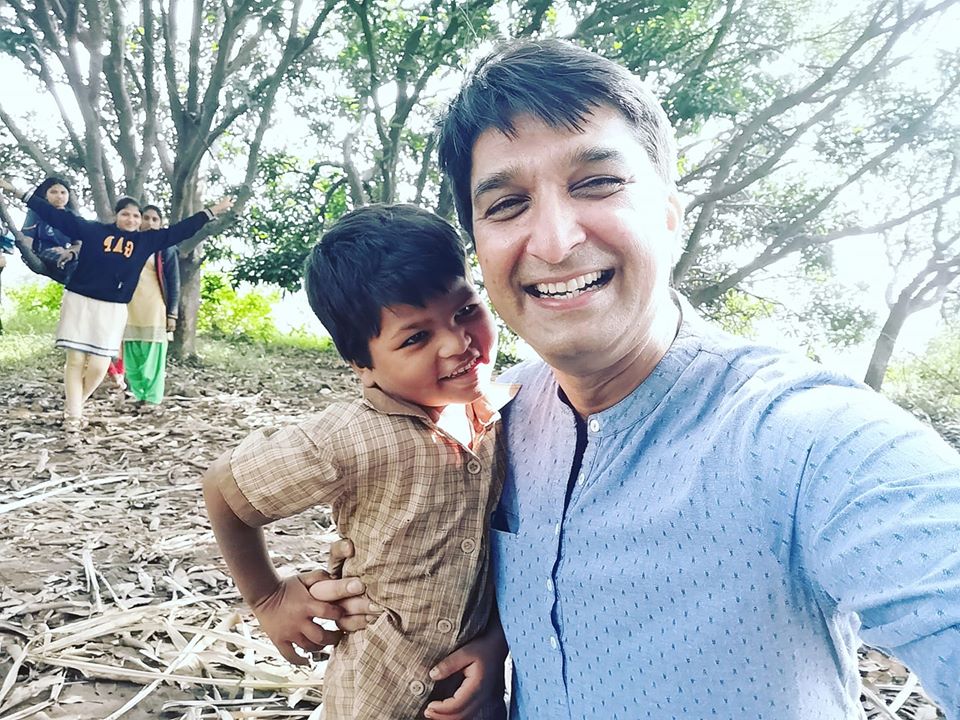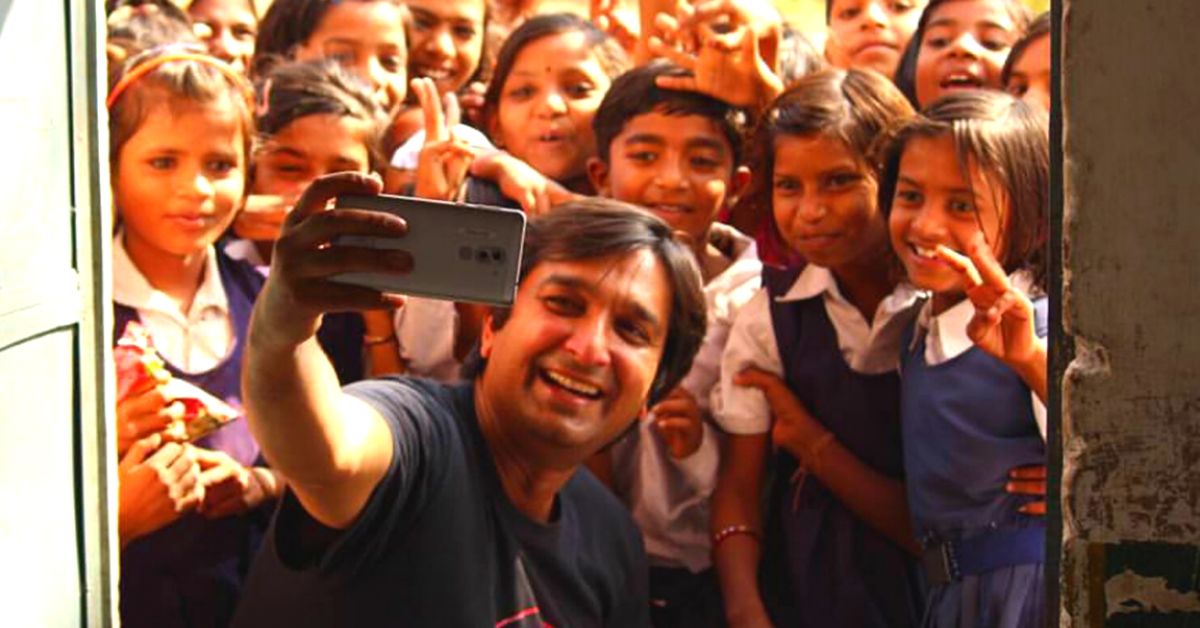With The Positive Collective, The Better India’s COVID-19 coverage is available to regional language publications for free. Write to editorial@thebetterindia.com for more details.
“It was a conversation with a friend – an Indian army officer, posted in Kashmir, that changed things for me. While describing his 100 KM run in the harsh climatic conditions, he said that he had controlled his mind into believing that he could feel no pain from the blisters. Stopping was not an option. These words resonated within me. That’s how Abhedya NGO was born in 2015,” says Amitabh Soni.
Soni had already failed twice to launch his developmental works in Indian villages – his life’s dream – due to logistic problems. But invigorated by these encouraging words, he finally quit his job in London, UK and returned to India to start his NGO.
Five years down the line, Abhedya has a presence in five tribal villages near Bhopal. By working in different sectors like education, organic farming, governance and water solutions, the NGO taps the inherent skills of the villagers to help them become self-reliant especially during the off-seasons. Soni is actively helping village youth to find work opportunities in their villages instead of migrating to urban areas for employment opportunities.

Among their many ventures, a small IT initiative called ‘Willage Quest’ is Soni’s most successful project that accepts year-round freelancing work related to data entry.
While it is no doubt that Soni is making a difference in the tribal belts, he humbly says that there are no revolutionary ideas, “I aim to provide tools to the villagers so that they can solve their challenges. I am not here to preach on what they should do. All I want to do is give them opportunities to develop their own lives.”
A Step Towards Social Development
It was during his BA course when Soni found his true calling. Studying subjects like Political Science, English Literature and Economics pushed him to question the social structure of our society. He found several answers but none that gave a concrete explanation about the burgeoning economic gap between the rural and urban society.
In search of answers, he went to London to pursue Master’s in State, Society and Development in 2003. However, he had to drop out due to a severe spinal injury. He found an alternative route to understand social development by applying for a job at the UK Government’s Social Service Department.
His decade-long career at the department helped Soni gain experience of dealing with people. In his words, “I saw how social inclusion could do wonders in the overall development and growth of a country. The idea is to empower vulnerable communities by penetrating growth opportunities in the remotest parts.”
Once he was confident of what he wanted to do, Soni left his job and moved to India in 2014.
Establishing A Connect
Soni had skills, knowledge and ideas; he lacked the knowledge of ground realities of rural community life.
He chose to start his activities in Kekadia village (23 km from Bhopal) with a population of around 1400. With the majority of the houses engaged in agriculture activities, he observed the lack of importance accorded to education and the problem of youth migration to cities for employment.
Soni spent months with the families to understand their needs, “Often, NGOs and governments provide things that they think will help the vulnerable communities develop. But they fail to establish a dialogue with them and don’t factor their needs. It widens the gap. I saw things from the people’s perspective,” he explains.
Generating Incomes Via IT-Centre
One of the most essential lessons Soni learnt was that if given a choice, the villagers do not want to leave the villages during the off-seasons for a livelihood, but they did not have the luxury to choose.
That’s how the idea to start an IT-centre struck. It would be an extra source of income without having to migrate and at the same time, make the villagers technology-literate. To that end, Soni began with teaching in a government school. He conducted several awareness sessions with parents and students about building the centre.
Once he had identified students who were keen on learning basic computer skills, he asked for second-hand computers from his friends and family. Meanwhile, the Gram Panchayat Committee agreed to accommodate the IT Lab and a Youth Centre at its Community Centre Hall. Along with computers, Soni also set up a library for students.
Soni trained around 20 youth from Kekadia and the neighbouring villages in Microsoft Softwares, typing and data entry. Every month, the NGO approaches companies in urban areas for freelance projects. There are times when there are no projects but it’s still a good beginning. Of the total members, three are on a pay-roll basis, while the rest are paid based on the needs of the project.
“Our customers vary from publishers, individuals to technocrats who sublet basic data work to us. Monthly, each member of our NGO earns up to 7,000. Also, we have given laptops to girls so that they can work remotely,” says Prem Kumar, a BSc graduate, who manages the activities of the centre.
What makes this job lucrative for Prem is that he can dedicate his time to his family farm and get an extra source of income. He also saves money that he otherwise would have spent on rent and travelling if he were working in the city.
Other Projects
Banking on the success of the IT-centre, Soni is running a campaign inviting people to fund children’s education in private school.
“Children have a lot of potential, but limited access to funds and resources forces them to go to government schools which may not run on full capacity. The campaign worked, and our well-wishers sponsor the education of 52 kids (47 girls),” says Soni.
Speaking of one of the students, Mukesh Tomar who is a third-year student at the National Law University (Bhopal), Soni says, “Mukesh and his family were going through turbulent times when I met them. The young boy, with a phenomenal drive to pursue law, was working to save his land. We mentored him for the entrance exams and the NGO is sponsoring his college fees. He is setting an example for all the children in the village. If this isn’t a sign of growth, then I don’t know what is.”
Soni and his team also regularly invite NGOs and government officials to conduct workshops on political rights of individuals and the panchayat.
Among other things, Soni has worked with the farmers to adopt organic farming and is also planning to build a series of dams and planted trees to address water woes. They are currently awaiting its execution through government or private partnerships.
One of the main challenges in implementing projects is to meet the expenses. Though Soni relies on donations and crowdfunding, these options are not stable. So on certain occasions, he has to postpone or cancel the projects.
But that hasn’t stopped Soni. Every time there is a hurdle, he remembers his friend’s encouraging words and embarks on yet another noble work.
Get in touch with Amitabh Soni here
(Edited by Saiqua Sultan)
Like this story? Or have something to share?
Write to us: contact@thebetterindia.com
Connect with us on Facebook and Twitter.
If you found our stories insightful, informative, or even just enjoyable, we invite you to consider making a voluntary payment to support the work we do at The Better India. Your contribution helps us continue producing quality content that educates, inspires, and drives positive change.
Choose one of the payment options below for your contribution-
By paying for the stories you value, you directly contribute to sustaining our efforts focused on making a difference in the world. Together, let's ensure that impactful stories continue to be told and shared, enriching lives and communities alike.
Thank you for your support. Here are some frequently asked questions you might find helpful to know why you are contributing?

